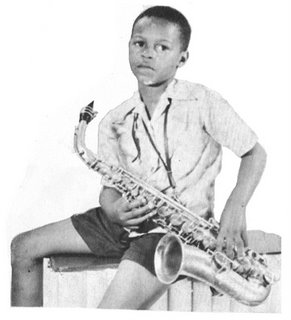
I went to see the Albert Ayler documentary on Friday. The director was a no-show due to family problems, and the stand-in revealed a lack of knowledge into the subject, which may be because she was a last minute "reserve". I don't know. The documentary was hardly very original stylistically; we get 8 mm film with voice-overs, both in the form of old interviews with Ayler and comments from the director, coupled with interviews and concert clips. But it did turn out to be a warm tribute to Albert Ayler (AA). My biggest fear with such documentaries is that they'll portray the musicians as "troubled geniuses". Luckily, no such intention seem to have been on the directors mind, as AA comes across as a soft-spoken albeit headstrong man with an almost childish eagerness for his music to be heard. Only in the latter part of the film do we get hints of a man in distress, which I will return to.
The film is pretty much chronological; it starts with his childhood in Cleveland, and continues through his stint in the army and to his trip to Sweden. Here he recorded his first album, and later met Sunny Murray, who was playing with Cecil Taylor at the time. He is invited to join Cecil Taylor in Denmark, and they convince him to join them back to New York. This is when he got his recording deal with ESP-disks, and started his famous trio with Sunny Murray and Gary Peacock, which recorded Spiritual Unity (said record is given some consideration, as it has been acknowledged by many as Ayler's masterpiece). The trio was later joined by AA's younger brother, Donald. In New York, AA met John Coltrane, who turned out to be one of his biggest fans and played a part in getting him signed to Impulse!. From then on the film takes us through tours of Europe, one of which ended with Donald Ayler having a nervous breakdown, back to New York, and ends with the mysterious death of AA in 1970.
There are interviews with his family, friends and musicians, among them Sunny Murray (drummer), Gary Peacock (bassist), ESP-founder Fred Berkhout, Michel Sampson (violinist), and Mary Parks, Albert's last wife. I was especially taken by his father, who seemed like a really humble and kind old man. A nice touch by the director is that he plays Ayler's music to several of the interviewees. In this way he gets to focus on the music, but at the same time the tunes he plays seem to bring back old memories. Gary Peacock in particular appeared to be moved as he recognizes the first few notes of "Ghost: First Variation" from Spiritual Unity.
Much has been made of the relationship between Albert Ayler and religion, but it is made clear that he didn't become very religious until after his first time in New York, a time marked by long stints of hunger and lack of money as well as glorious music. Mary Parks, Ayler's last wife, is said to have had a lot to do with turning him into an old Egyptian religion which includes so-called "sun-watching", and several of AA's friends blame her for secluding him from them in the latter part of his life.
The film ends with the death of AA, and although there are many theories on what actually happened before he was found floating in the Hudson River, the director focuses on the theory that AA took his own life because of having severe guilt from first leaving his beloved mother, who was partially paralyzed, and later for kicking his brother out of the band when he was diagnosed with mental disorder. However, his father does not seem to place much credit to this theory.
Overall though, a nice portrait of Albert Ayler, and a recommended piece of Jazz history.
PS: Several of the interviews with AA himself can be found on the Revenant box set Holy Ghost (Revenant 213)
No comments:
Post a Comment